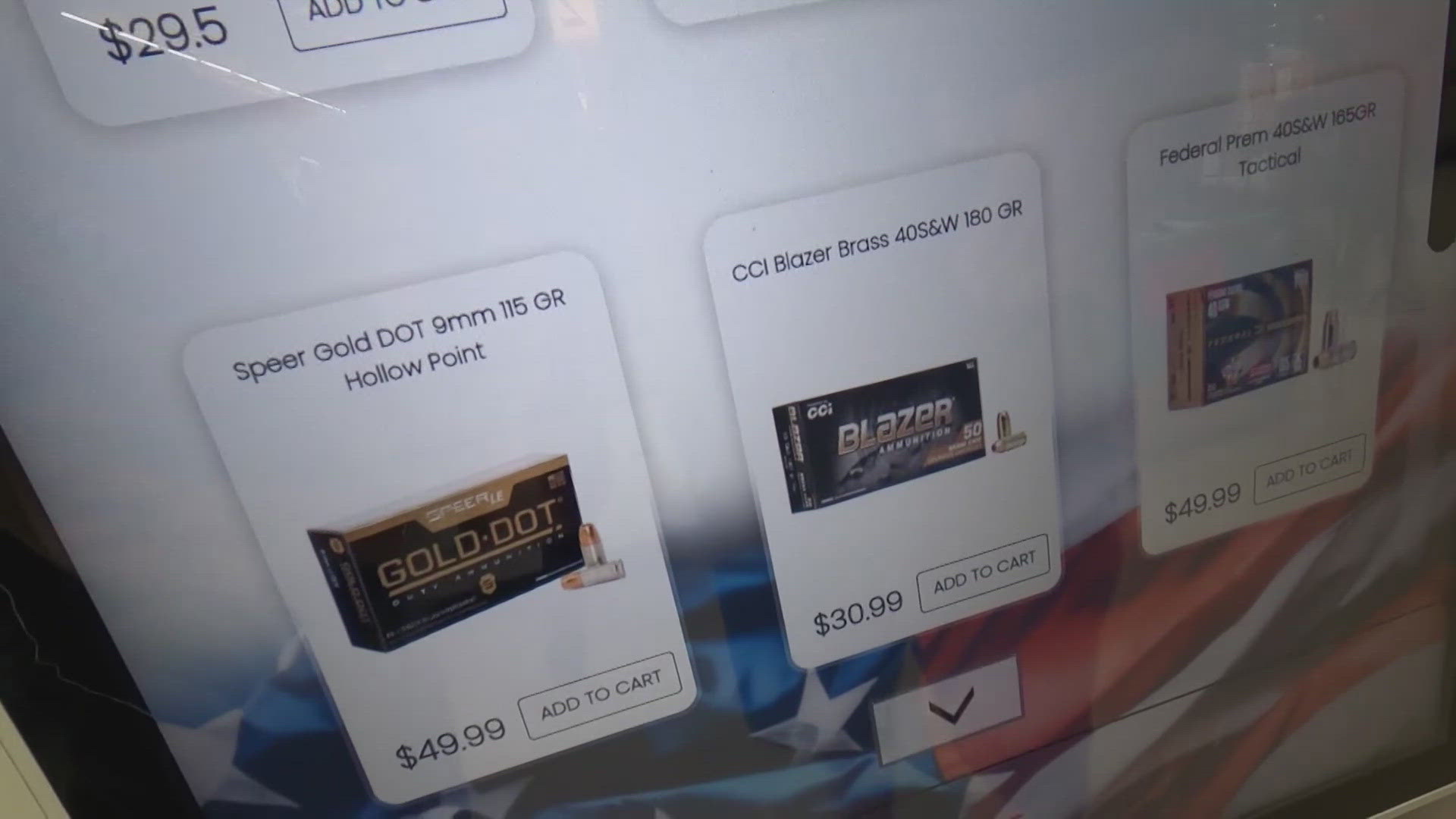RICHARDSON, Texas — It's been a whirlwind of a week for Grant Magers. He's the CEO of American Rounds, a Richardson company specializing in automated retail -- with a bang.
Not many knew who he was or what he did until a story about one of his 'ammo vending machines' caught fire the day before the Fourth of July.
Now, his product is internationally known, receiving both criticism and praise.
"I'm averaging about seven or eight interviews daily," Magers said. "I mean all over the country -- we interviewed with some folks in Dublin, BBC Tonight, we've been contacted by people in the United Arab Emirates and even Japan."
"So people worldwide are curious as to what this is," Magers said.
This has likely never been seen or digested by the American public. Magers' company has six vending machines in select grocery stores across Oklahoma, Alabama, and Texas -- but they're not your average hunk of metal collecting dust in a corner.
Instead of a candy bar or a soda -- they drop ammunition.
It's an eyebrow-raising novelty that lets consumers scan their license or ID and walk away from the store with more than a gallon of milk or a loaf of bread.
A facial recognition scan also ensures the person buying rounds matches the ID given. The machines won't sell to a person under the age of 21. Federal law prohibits the sale of handgun ammo to anyone younger, though rifle ammo can be bought at the age of 18.
"We're the safest, most secure method of ammunition sales on the market currently," Magers said. "Our ID reader is the same as the TSA's -- it's the highest quality. Any minor can go to the website of a big box sporting goods store and click the box saying they're 21 and order 1,000 rounds to their house."
Magers calls it the future—smart, automated ammo sales. The origin of the product makes sense. Most of the grocery stores with his machine are in rural areas where a drive to a sporting goods store might take some time.
The only store with a machine in Texas is in Canyon Lake.
"Sometimes, the customers of these stores might have to drive an hour outside of town to grab ammo. Those grocery stores came to us with this idea -- they wanted to offer a sporting goods package for hunters in their communities. We realized that -- we're on to something special in providing for them and safely selling ammunition while maintaining the integrity of the Second Amendment."
Magers told WFAA that eight machines, including one in Colorado, should be up and running by the end of the month. However, he also said that 200 orders have been taken.
"Our sales are up 900% since the first story went viral," Magers said. "We have 200 locations waiting on a machine and are getting 20-25 emails per hour."
Magers wouldn't go full Shark Tank with WFAA and reveal the full scope of his sales but mentioned that most of the stores wanting machines aren't big fish chains.
However, he did mention that a group his company is working with has over 800 stores.
"One of my partners was at one of our stores recently, and there were 15 people at the machine waiting to use it," Magers said.
Gun reform advocates have groaned, though, since news of Magers' machines gained steam online. Many have called the machines jarring and said they have no place where children routinely go with families to buy food for their tables.
Magers said, "Walmart sells milk, eggs, bread... and guess what? They also sell ammo -- it's just in the sporting goods department."
You don't need a license in Texas to sell ammunition, and there are no rules in the penal code that dictate where it can be sold.
It does, however, prevent sales to anyone who is intoxicated or a felon before their 5th anniversary of being released from prison, parole, or supervision.
Magers' machines do little to prevent those sales from occurring -- aside from a questionnaire that anyone could lie on.
He did, however, provide this response.
"Anyone with bad intentions -- are they more likely to go to a pawn shop and buy their ammo with cash? Are they more likely to go online and have it shipped to their house? Are they more likely to shoplift it? Or are they more likely to go to one of our stores -- scan an ID, use a credit card, and consent to facial recognition? We mitigate risk better than anybody."
The hardest pitch, however, might be to gun owners. Sure, these machines can be beneficial if you live in a rural area. But what makes this more than a novelty item?
Magers said, "Isn't it better to work with a company doing its best to maintain safety and security? We're always worried about gun laws getting worse -- the safer we can make it, the less need there is for that."
Also on WFAA.com:

